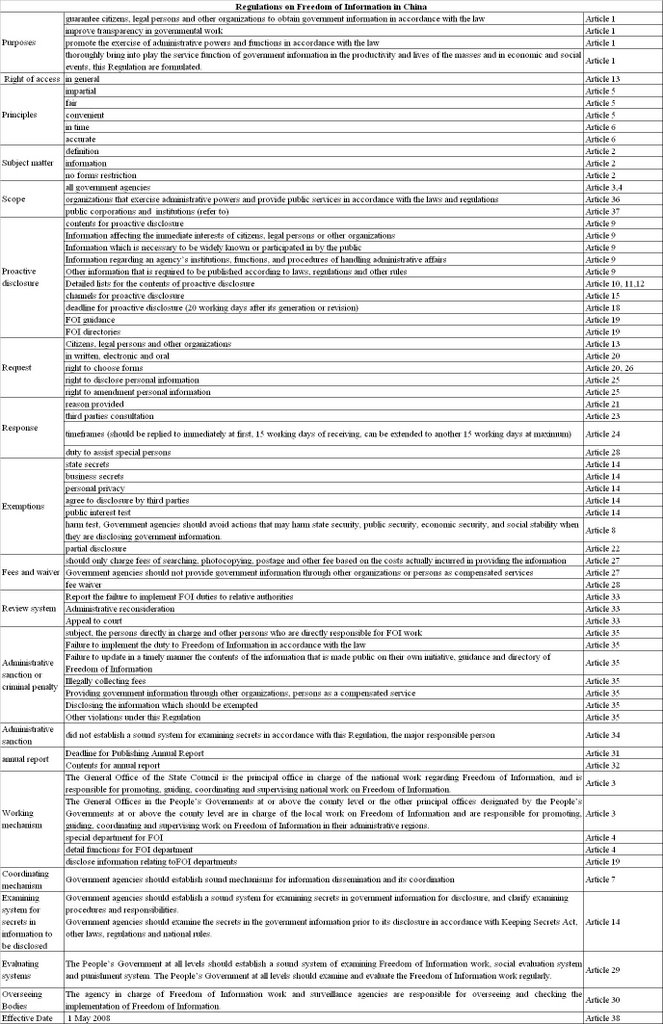Introduction for Freedom of Information Regulation in China
China: Freedom of Information Regulation
Introduction
China’s State Council published its final version for Freedom of Information Regulation (FOI Regulation) on 24 April 2007 which was approved in principle by the Council on 17 January. This Regulation will come into effect on 1 May 2008. China finally has its own national FOI legislation, although the influence of this Regulation is still limited as it should not override the laws or acts in accordance with the China’s legal system.
The Purposes
There are four objectives identified in Article 1 of the Regulation, including guaranteeing citizens, legal persons and other organizations to obtain government information legally, improving the degree of transparency in governmental work, promoting the exercise of administrative powers and functions in accordance with the law, and fully fulfill the service function of government information to the people’s production, life, economic and social activities.
Coverage
The coverage extends to government agencies at all levels (Article 4) and organizations that exercise administrative powers and provide public services in accordance with the laws and regulations (Article 36). Public corporations or institutions that are highly related to the benefits of the public, such as schools and universities, hospitals, refer to this Regulation to disclose their information (Article 37). The target of access is government information which is produced or obtained by government agencies during the process of exercising powers and responsibilities. It seems that there are no forms forbidden in the Regulation as it uses a general term “some forms” which can be explained broadly (Article 2).
Principles
Five basic rules are required by this Regulation, including impartial, fair, convenient, timely and correct ones (Article 5, 6).
The duty to publish
This Regulation differs from the laws in other jurisdictions as it puts emphasis on the duty to publish. In general, all government agencies should proactively disclose the information which has one of the following features: Information affecting the immediate interests of citizens, legal persons or other organizations; Information which is needed to be known or participated by the public widely; Information regarding an agency’s institutions, functions, and procedures of handling administrative affairs; and other information which is needed to disclose in accordance with laws, regulations and other rules (Article 9).
In order to clarify the duty to publish in Article 9, Article 10, 11 and 12 of the Regulation have a detailed list for each kind of government agencies to fulfill their responsibilities. Normally, the People’s Government at or above the county level should publish the information regarding government expenses, administrative approvals, government procurements, sudden public incidents, specific fees for public services and results of investigations into environmental protection, public health and food and drugs safety and others. Government agencies at the districts and county level are required to publish information on land acquisitions, residence relocations and related compensation and others. Government agencies at the town level should publish information on land use, financial accounting, the operation of rural collective enterprises and others.
Each government agency should compile and publish its information guidance and directories in a timely basis (Article 19).
Government agencies should disclose the information which is required to publish not later than 20 working days after its production or updating (Article 18) by government Gazette, government websites, news conferences, newspapers, radios, televisions and the like (Article 15).
Requests
Citizens, legal persons or other organizations can request government information held by government agencies in accordance with their needs in business, life, research and other special needs (Article 13). Oral, written and electronic requests are allowed (Article 20). No grounds are required for requests (Article 20). The rights to request and amend personal information are allowed (Article 25).
Response
Partial disclosure is allowed and reasons for refusals should be provided (Article 21, 22). Third party consultation is required in Article 23.
Timeframes
Government agencies should give a response immediately to the requesters. If a response cannot be given immediately, government agencies should reply to the requesters in 15 working days after they received the requests. The time period for responding may be extended and the extension should not exceed 15 working days (Article 24).
Exemptions
Government agencies should review the information at first before its disclosure.
Government agencies should not disclose the information regarding state secrets, business secrets and privacies. Government agencies can only disclose the information regarding business secrets and privacies with the consent of the right persons or when the agencies believe non-releasing it would seriously harm the public interest (Article 14).
However, Article 8 requires that government agencies should avoid actions that may harm state security, public security, economic security, and social stability when they disclose government information.
Fees for Access
Fees for access should be limited to the cost for searching, photocopy, postage and others based on the costs actually incurred in providing the information. Fee waiver is allowed (Article 27).
Annual Reports
An Annual report for FOI is required and it should be published by each government agencies before 31 March of each year (Article 31,32).
Review System
The public that believe that the concrete administrative behavior of government agencies regarding FOI has infringed their lawful rights and interests, may require administrative reconsideration or administrative lawsuit in accordance with the law (Article 33).
Sanctions
There are sanctions available against government officials for failure to fulfill their duties of disclosing government information, update information in a timely basis, illegally collect fees, disclose the information which should be exempted and others (Article 35).
Note:Many reports translated this legislation into “Open Government Information Regulation”, I prefer to translate it into “Freedom of Information Regulation” in order to avoid some confusion arising from the differences between “openness” and “FOI”. #

No comments:
Post a Comment